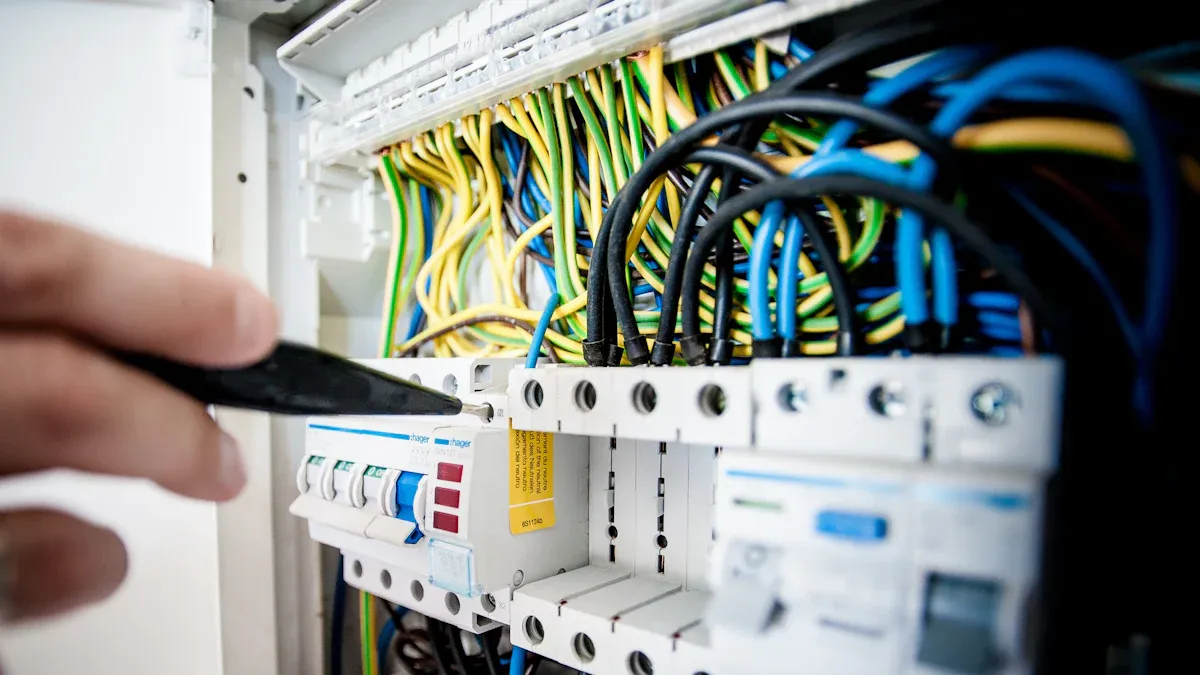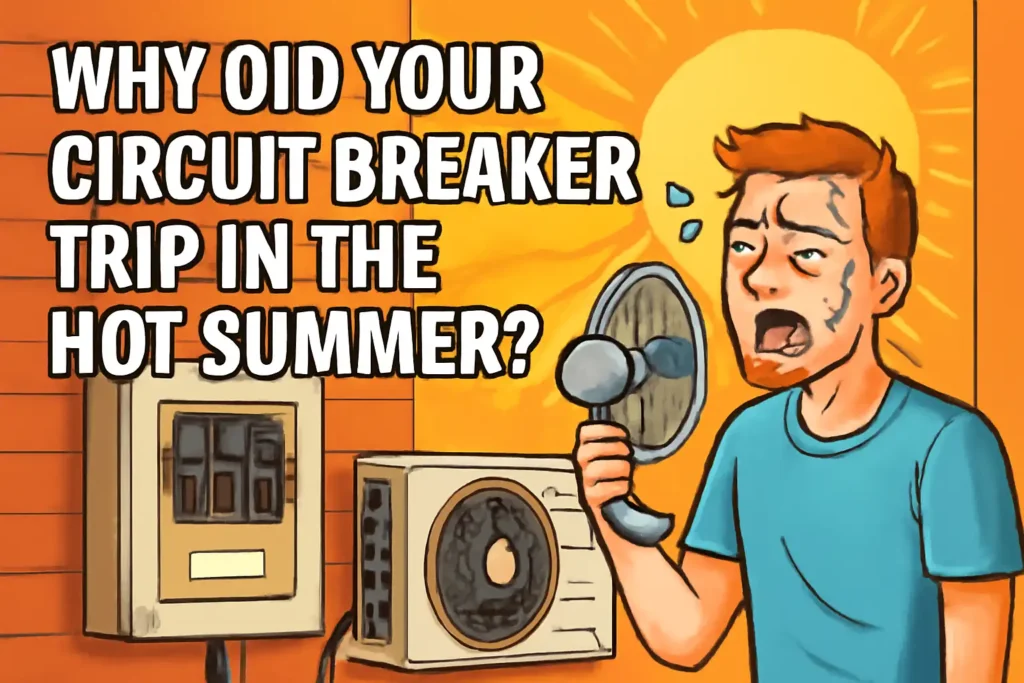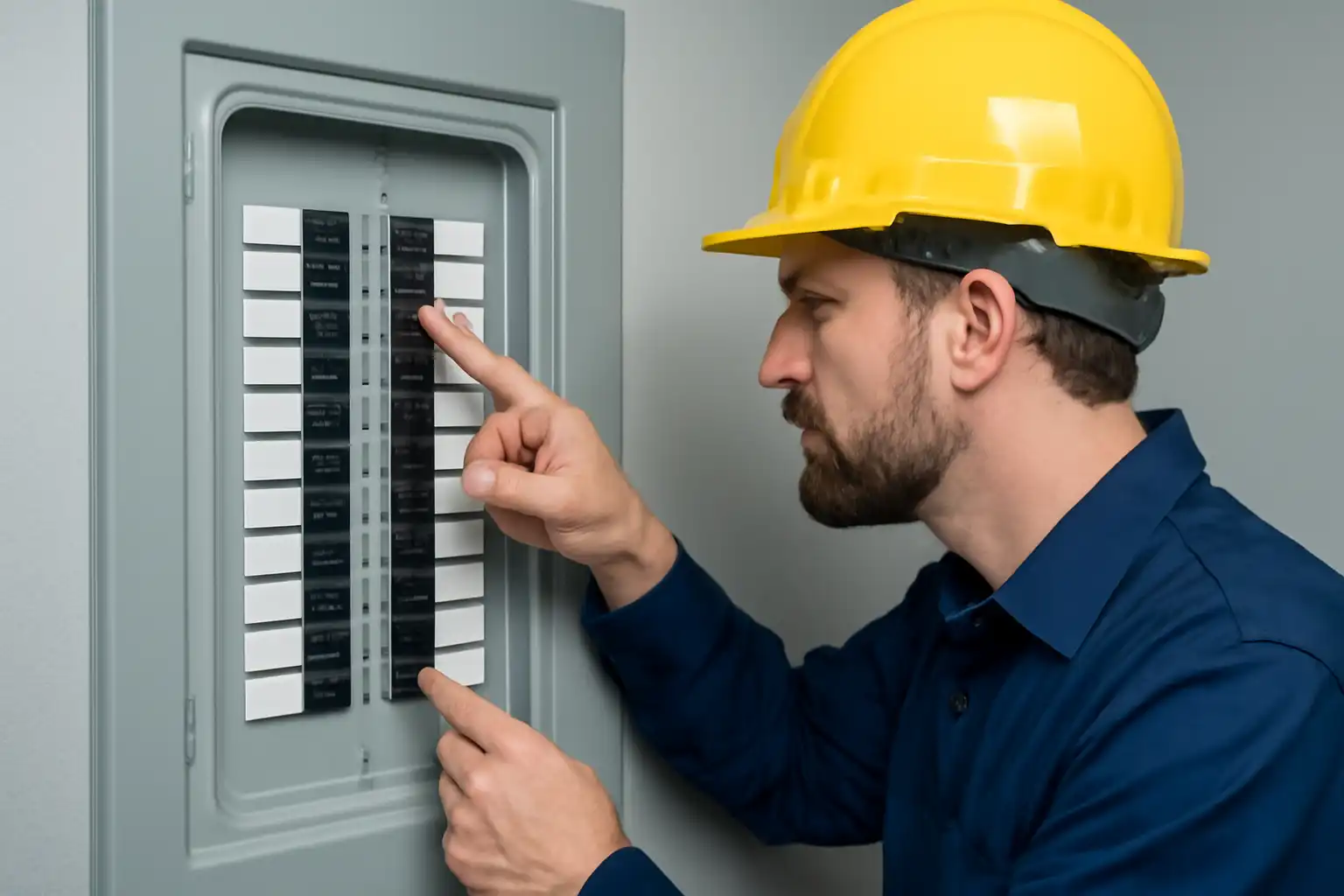Hot weather causes circuit breakers to trip, making them shut off. The heat makes your home’s electrical system work harder, leading to overheating. Devices like air conditioners and fans use more power, which stresses the circuits. When breakers get too hot, they turn off to prevent fires or damage. This issue can also arise if your electrical panel is old or lacks proper ventilation. Understanding these reasons can help keep your home safe and your devices functioning properly.
Key Takeaways
- Hot weather makes people use more electricity, like with ACs. This can overload circuits and trip breakers.
- Keep your breaker box cool by putting it in shade. Make sure air can flow around it to stop overheating.
- Check your electrical system often to find problems early. This helps avoid breaker trips during hot summer days.
- Replacing old electrical panels can make your home safer. It also helps handle today’s energy needs better.
- If your breaker trips a lot or you smell burning, call an electrician to stay safe.
How Hot Weather Causes Circuit Breakers to Trip

Effects of High Ambient Temperatures on Breaker Components
Hot air can affect how circuit breakers work. When the area around your breaker box gets warm, it heats the parts inside. This extra heat can make the breaker trip sooner, even if you’re not using more electricity. Studies show that heat wears out electronic parts, like RCCBs, faster. As it gets hotter, these parts break down quicker, making the breakers fail more often.
If your breaker box is in a sunny or stuffy spot, the problem gets worse. Poor airflow traps heat, which overheats the parts inside. Over time, this constant heat can shorten the life of your breakers and make them less dependable. Keeping the breaker box in a cool, shaded place with good airflow can help.
Overheating and Its Role in Tripping Mechanisms
Overheating is a big reason why breakers trip in hot weather. When your system gets too hot, the breaker shuts off to keep your home safe. Breakers are made to stop fires and electrical damage. Overheating happens in two main ways:
| Overheating Type | What Happens |
|---|---|
| Too Much Current (OEC) | When too much electricity flows, wires heat up, and insulation can burn. |
| Insulation Breakdown (OIB) | When insulation wears out, heat escapes and raises fire risks. |
In summer, devices like air conditioners use more power, which can overload circuits. If your breaker trips a lot during heat waves, it means your system is struggling. Fixing this quickly can protect your electrical setup from damage.
Influence of Thermal Expansion and Bimetallic Strips
Heat changes how breakers work because of thermal expansion. Inside each breaker, a bimetallic strip acts like a heat sensor. This strip has two metals that expand differently when they get hot. As one metal expands more, the strip bends and trips the breaker, stopping electricity flow.
On hot days, the outside heat can bend the strip even without extra electricity use. This makes the breaker trip more easily, especially if you’re using a lot of power. While this design prevents fires, it can also cause annoying trips in extreme heat. Avoid overloading circuits and keep the breaker box cool to reduce these trips.
Reasons Why Circuit Breakers Trip in Summer
Circuits Overloaded During Hot Weather
During heat waves, your home’s electricity use increases a lot. Air conditioners, fans, and refrigerators work harder to cool your home. This extra demand can overload circuits, making breakers shut off. Summer storms can also cause power surges that stress your system. Lightning sends sudden electricity spikes through wires, forcing breakers to trip. Heavy rain can let moisture into electrical parts, causing short circuits. When circuits get overloaded, breakers trip to stop fires or overheating.
Air Conditioners and HVAC Systems Using Too Much Power
Air conditioners and HVAC systems often cause summer breaker trips. They use more power when parts like fan motors or refrigerant levels fail. Broken compressors can make them pull too much electricity. If your electrical panel is old or damaged, it may not handle the load. Overloaded circuits make breakers trip again and again, showing there’s a problem. Regular HVAC maintenance can prevent these issues and reduce tripping risks.
Poor Ventilation and Sunlight Affecting Breaker Boxes
Where your breaker box is placed matters a lot. If it’s in a hot or sunny spot, it heats up fast. Breakers trip more often when exposed to high temperatures. Poor airflow traps heat inside the box, making cooling harder. Over time, this heat weakens breakers, causing frequent trips. Keeping the box in a shaded, airy spot helps it stay cool and work better.
Aging or faulty electrical panels
Old or broken electrical panels can trip breakers more in summer. As panels get older, their parts wear out and stop working well. This makes overheating more likely when your home uses lots of electricity. Older panels might not handle modern appliances, causing frequent trips.
You may see signs that your panel has problems:
- Breakers trip often, showing the panel can’t handle the load.
- A burning smell near the panel means overheating or sparks.
- Breakers feel hot, which shows overloaded circuits or issues inside.
When the panel gets too hot, breakers trip to stop fires or damage. This happens more in summer because of high electricity use and hot weather. Old panels may not spread electricity evenly, adding more stress to the system.
Older panels have more electrical issues. They lack the safety features of newer ones. This makes them more likely to have insulation problems or internal faults. Upgrading to a new panel can lower these risks and make your home safer. Regular checks can find problems early and keep your system working well during heat waves.
Tip: If breakers trip a lot or you smell something burning near the panel, call an electrician. Fixing these problems quickly can save money and protect your home.
Identifying and Resolving Circuit Breaker Issues
Signs of Heat-Related Tripping
Hot weather can cause clear signs of breaker problems. If your breaker trips often during summer, it means your system is overloaded. A burning smell near the panel shows overheating or damaged parts. Buzzing sounds from the panel might mean serious internal issues. Rust, discoloration, or damage on the breaker box are signs it needs fixing. Outlets or breakers that feel hot suggest too much electricity or loose wires.
Tools can help find the exact problem. Infrared thermography spots hot areas in your system, showing loose wires or overloaded circuits. Ultrasonic testing finds high-pitched sounds caused by insulation problems or sparks. Partial discharge testing detects early insulation issues, helping you avoid future failures.
| Diagnostic Technique | What It Does |
|---|---|
| Infrared Thermography | Finds hot spots in wires or connections. |
| Ultrasonic Testing | Detects high-pitched sounds from sparks or insulation problems. |
| Partial Discharge Measurements | Spots early insulation issues to prevent bigger problems. |
Steps to Troubleshoot the Problem
Fixing breaker issues needs careful steps. First, look for signs like burning smells, crackling noises, frequent trips, or visible damage. Turn off the main breaker before checking the panel to stay safe. Wear safety gear and follow proper procedures to avoid accidents.
Check if circuits are overloaded. Unplug devices you don’t need during busy hours. Make sure the breaker box has good airflow and isn’t in direct sunlight. If the breaker keeps tripping, call an electrician to see if you need a new panel.
For long-term fixes, schedule regular check-ups and plan for upgrades. Keep spare parts ready for quick repairs. Adding vacuum interrupters can also help prevent future problems.
- Look for Damage: Check for burning smells, strange noises, frequent trips, or broken parts.
- Stay Safe: Turn off the main breaker, wear safety gear, and follow proper steps.
- Plan Ahead: Schedule maintenance, keep spare parts, and plan for upgrades or replacements.
When to Reset the Breaker and When to Seek Professional Help
Knowing when to reset a breaker or call for help is important. If the breaker trips right after resetting, it could mean a short circuit or ground fault. Frequent trips during high use show an overloaded circuit that needs fixing or upgrading. If the breaker works inconsistently, it might be worn out and need replacing.
| Problem | Likely Cause | What to Do |
|---|---|---|
| Trips right after reset | Short circuit or ground fault | Call an electrician |
| Frequent trips during high use | Overloaded circuit | Unplug devices or upgrade circuits |
| Inconsistent performance | Worn-out breaker | Replace the breaker |
If you see rust, buzzing sounds, or discoloration on the panel, call a professional. Trying to fix these yourself can be dangerous. Only reset the breaker if the issue is simple, like unplugging extra devices. For bigger problems, an electrician can fix things safely and correctly.
Tip: If you smell burning or notice hot outlets, don’t reset the breaker. Call a licensed electrician right away.
Preventing Circuit Breaker Tripping in Hot Weather
Reducing Electrical Load During Peak Hours
Using less electricity during busy times helps stop breaker trips. Summer heat makes cooling systems use more power, stressing circuits. Lowering energy use keeps your system working well.
Try these tips to save energy during peak hours:
- Use systems like ice storage to shift energy use to quieter times.
- Join programs that pay you to use less power during busy hours.
- Adjust your HVAC settings to make it run more efficiently.
Studies show small thermostat changes can save a lot of energy:
- Raising the thermostat by 1°C cuts energy use by 25%.
- Raising it by 2°C saves 66% more energy.
- Pre-cooling your home and adjusting the thermostat can cut peak demand by 68%.
Programs like California’s smart thermostat plan and Australia’s ‘CoolSaver’ project show how managing air conditioning can stop overloads. These steps protect breakers and lower energy bills.
Tip: Set your thermostat higher during busy hours and use fans to stay cool while saving energy.
Ensuring Proper Ventilation and Cooling
Keeping your breaker box cool is key in hot weather. Poor airflow or direct sunlight can overheat it, causing trips. Good ventilation and shade help prevent this.
Here’s how to keep your breaker box cool:
- Place it in a shaded spot, away from sunlight.
- Add fans or vents near the box to improve airflow.
- Don’t block airflow by storing items around the box.
If your breaker box is in a garage or basement, check for trapped heat. Use portable fans or vents to cool the area. Good ventilation stops overheating and helps your electrical parts last longer.
Note: Check around your breaker box often to make sure it stays cool and clear.
Scheduling Regular Maintenance for Your Electrical System
Regular check-ups help avoid breaker problems caused by heat. Electrical systems wear out over time, but maintenance finds issues early and stops overheating.
Studies show maintenance prevents most electrical failures. Systems not checked often are three times more likely to break. Regular inspections keep your system strong, even in summer heat.
Benefits of regular maintenance include:
- Fewer sudden problems that disrupt your day.
- Lower repair costs and better system reliability.
- Improved performance of breakers and other parts.
Electricians can fix insulation, replace old parts, and improve your system during check-ups. This keeps your home safe and avoids expensive repairs.
Tip: Plan maintenance before summer starts to prepare for higher electricity use.
Upgrading Old or Small Electrical Panels
Old or small electrical panels can trip breakers often in summer. These panels can’t handle the power needed for modern appliances and cooling systems. Upgrading your panel helps your home’s electrical system work safely and efficiently.
Older panels don’t have enough capacity for today’s energy needs. If your panel is over 20 years old, it might not spread electricity evenly. This can overload circuits and cause frequent trips. Breakers tripping a lot is a sign your panel is too small or broken. This isn’t just annoying—it can be dangerous and lead to fires.
Did you know? Outdated electrical systems cause 50,900 house fires yearly, says the U.S. Consumer Product Safety Commission.
Newer panels are built to handle more electricity and have better safety features. Upgrading can cut energy waste and lower your bills by 10% to 30%. It also lets you add energy-saving tools like smart thermostats or solar panels, making your home more efficient.
Experts suggest replacing electrical panels every 20-30 years. Circuit breakers can last 30-40 years, but frequent overloads or heat can make them fail sooner. If your breakers trip a lot or feel hot, it’s time to upgrade.
Why Upgrade Your Panel?
- Better Safety: New panels lower fire risks and prevent damage.
- More Efficiency: They support energy-saving devices and systems.
- Save Money: Less energy waste means lower electricity bills.
- Stay Updated: A new panel works with modern technology.
Tip: If your panel has rust, buzzing sounds, or discoloration, call an electrician. Upgrading now can stop bigger problems later.
Choose ONESTOP circuit breaker: With over 20 years of manufacturing experience, international certification assurance, and excellent quality, we help you comprehensively improve circuit safety protection.
Replacing an old or small panel isn’t just about stopping breaker trips. It’s about making your home safer and more efficient. An upgrade protects your family and keeps your system reliable, even on the hottest days.
Hot weather makes circuit breakers shut off due to overheating. High heat stresses breakers, even if electricity use is normal. Long exposure to heat can harm wires and insulation. Breakers stop fires and electrical problems but can overheat dangerously. Regular check-ups, good airflow, and upgrades keep them working well. Knowing these risks and acting early helps your system stay safe during summer heat.
FAQ
Why does my circuit breaker trip more in summer?
Hot weather makes cooling systems like air conditioners use more power. High temperatures also heat breaker parts, causing them to trip faster. Overloaded circuits and poor airflow near the breaker box make it worse.
Can sunlight on my breaker box make it trip?
Yes, sunlight heats the breaker box, raising its inside temperature. This can activate the breaker’s heat sensor, even without overloaded circuits. Keeping the box shaded can stop this.
How do I know if heat is causing my breaker to trip?
If your breaker trips often in hot weather, heat may be the cause. Burning smells, warm breakers, buzzing sounds, or visible damage are signs of overheating.
Should I reset my breaker every time it trips?
No, resetting often can hide bigger problems. If it trips again right away or looks damaged, call an electrician. Only reset for small issues like unplugging extra devices.
How can I stop my breaker from tripping in summer?
Use less electricity during busy times and improve airflow near the breaker box. Regular maintenance and upgrading old panels can also help handle summer heat and high power use.
The following information may be of interest to you
Can I replace a 15 amp breaker with a 20 amp?
Will one circuit breaker affect another circuit breaker
Can I replace a fuse with a circuit breaker?
What happens when using circuit breakers with higher current?





